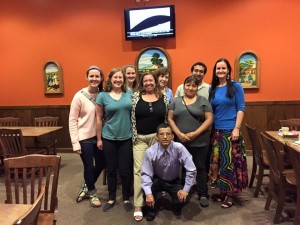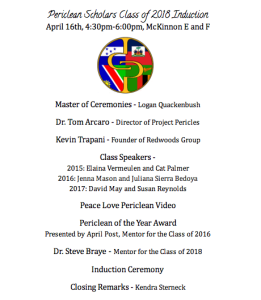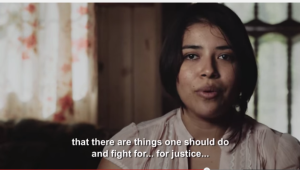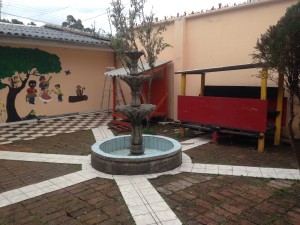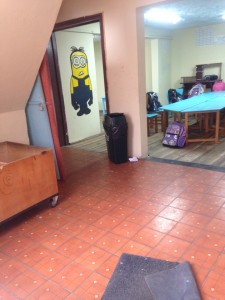This semester our partnership with Latinoamericanos Unidos Promoviendo la Esperanza (LUPE) has been challenging, but ultimately successful and rewarding. We have been challenged in developing our communication strategies and identifying cross-cultural and professional boundaries. As students, we have many resources and information that we can share, but we also recognize that we have much to learn from the members of LUPE. This realization is one that comes with humility and self reflection, and helps us understand what it truly means to be in a partnership. Together we have continued the joint ESL program, developing curriculum and recruiting volunteers to make the classes sustainable after we graduate in May. Through our role in this program, our efforts as students have compelled us to become active and informed members of the community. We have developed deeper ties both professionally and personally with the members of the organization, and we’ve come to understand a variety of systemic issues through their lens.
Our committee’s relationship with LUPE has been very different from the past semesters. We were able to immerse ourselves deeply in their organization by attending events, experiencing the taxing yet fulfilling process of community mobilization, and engaging in vibrant discussions at board meetings. LUPE’s monthly gatherings are held at Elon’s Downtown Community Center, which in itself helps to strengthen the relationship between Elon and LUPE. At the board meetings, members of our committee have had various opportunities to learn about what the organization does to help the community and respond to the needs of its constituents. We also were able to lead discussions to assist in organizational goal achievement and increased program efficacy. These discussions ranged from budgeting, to creating a 5-year plan, to organizing program information to prepare for grant applications. The LUPE board was always excited and willing to learn about how our groups could collaborate in order to strengthen their organization and better serve the Latino community in Alamance County. Some of our committee members even had the opportunity to discuss grants with the Board Director in her home over a cup of coffee. Being invited to her house was an amazing experience, in which we learned so much more about her past and her passion for helping others and how that shapes her involvement in LUPE.
On October 31st, North Carolina held another Faith Action ID drive at the Blessed Sacrament Church in Graham. This event was extremely symbolic of the collaboration between different members of the community, in light of the outcome of the HB318 vote that took place just days before. The event was a huge success, serving over 320 people from North Carolina and surrounding states. Police officials, religious leaders, media reporters, representatives from community non-profits, students, and local citizens gathered in a single space with a common goal of social justice and human equity. As student volunteers, the LUPE committee members saw first-hand the power of community organizing and solidarity at work. With the distribution of IDs, the leaders of Alamance County not only demonstrated their desire to be a part of the integration of the community, but they also defined their role as advocates for immigrant rights through opening a pathway for immigrants to assert their autonomy and–quite literally–their identity within the community.
In November, our committee was thrilled to hear that all funds raised during our upcoming Cookies to Go-Go event would support LUPE. In order to supplement the success of Cookies to Go-Go while also exposing our partner to the Elon community, our committee collaborated on an event that would take place alongside the fundraiser’s headquarters in the Moseley Student Center. There, we planned a live film screening of El Regreso and sold homemade desserts provided by LUPE’s board members. This event was appropriately called “Cookies to Go-Go LIVE”, as student participants were able to see our Periclean class’s main fundraising event come to fruition, while also having the opportunity to interact with a valuable local partner. Our committee’s sustainable efforts were focused on encouraging Elon students to get to know LUPE and its mission, while also understanding more about Latino culture through the film experience. As this effort was a success both for the members of Periclean and LUPE, we hope to plan a similar event for next semester. Our committee agreed that Cookies to Go-Go LIVE was a great way to finish the semester and set the trajectory for our committee’s plans to make this relationship truly sustainable. We hope to invest our efforts in the Elon student body by fostering a sense of curiosity, passion, and respect among students with regard to the role LUPE plays in the greater community. By educating other students about the issues that LUPE confronts, we hope to build the foundation for a collaborative relationship that strives to pursue a common vision for social justice even after we graduate.
–Erin Luther, Anna deDufour, and Megan Griffin

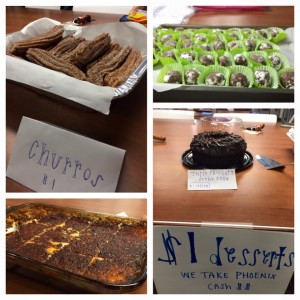

 Follow
Follow

